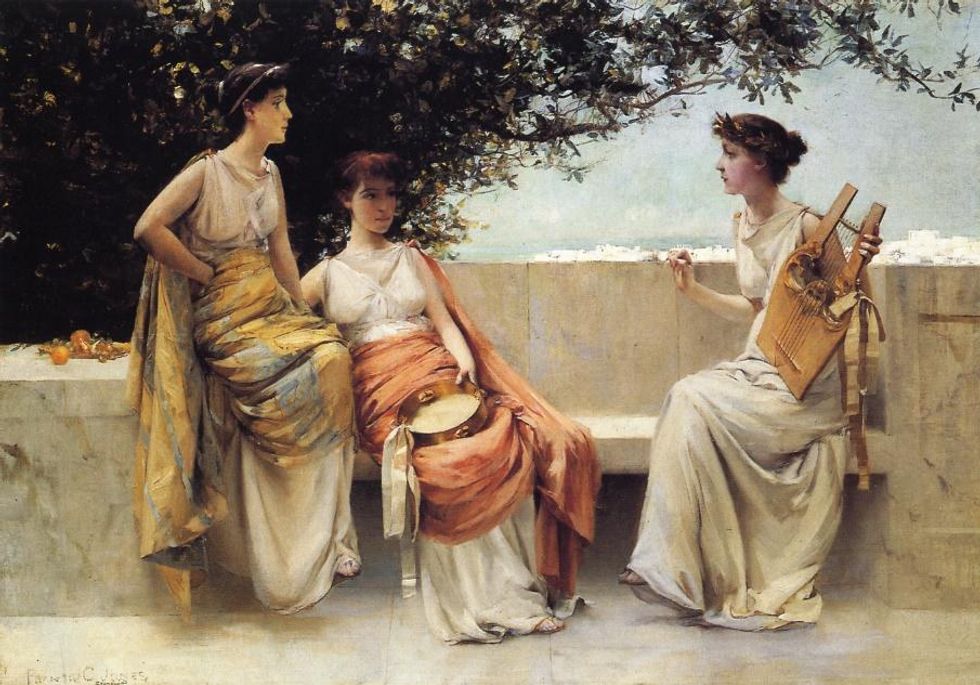For many, poetry is a way letting out the emotions that are otherwise difficult to express. Many people listen to a love song on the radio and can instantly relate. This style of writing requires a writer to have no boundaries. Sappho is a poet that broke the barrier between writer and audience. She gave her writing everything she had. She also wrote about subjects that would be considered controversial today, as made evident by her poem, "He is More Than a Hero." In many ways, Sappho is a revolutionary poet whose work, despite mostly being lost, has greatly inspired and influenced writers since her time because of her melodic style and fearless tendency to write about topics that are widely considered taboo.
Sappho is considered to be the
greatest female writer of the ancient world. She resided on an island in
Ancient Greece by the name of Lesbos, located in
the Aegean Sea off the west coast of Asia Minor, which is modern day 
Sappho's
work is part of a class of poetry known as lyric poetry. Her poems, which she
would often accompany by playing a lyre, were extremely personal and expressed
her innermost feelings. She articulated her emotions through writing. Her poetry often hinted at sexual desire for women. She wrote about
both men and women, and was not afraid to write entire poems about her
attraction to a woman. Today, her writing would be considered controversial.
However, during her time, that was not the case.
In Ancient Greece, love was meant to be experimental
and liberating. It was an experience meant for two people, regardless of
gender. Homosexuality was not ridiculed or look down on. Unlike
modern society, a person was not socially defined by their sexual orientation.
Even gods of Ancient Greece, such as Apollo, were said to have had homosexual
affairs. Sappho has written many poems that support and showcase
the normality of homosexuality in Ancient Greece.

The first line of the poem, "He is more than a hero, he is a god in my eyes," makes the reader believe that Sappho is in love with this man. She compares him to a god, which is the highest compliment anyone could receive in Ancient Greece. Then, Sappho surprises the reader by giving the reason for her admiration. She says, "the man who is allowed to sit beside you." It is now clear to the reader that Sappho's passion is for the woman that the man is with. The reason that she compared him to a god is because he is lucky enough to get to spend time with this new mystery woman. Only a god should be able to experience being with this woman.
She then goes on to describe the woman, including personal details that Sappho enjoys. She uses descriptive language by saying, "sweet murmur of your voice" and "enticing laughter that makes my own heart beat fast." By saying this, Sappho is acknowledging that she has feelings for this person. She uses something as simple as laughter to express what she loves about her. This shows that her feelings are true and intimate, yet she does not reveal them to the woman she is talking about. Just the sound of her voice can make Sappho's heart race.
Then, Sappho contemplates what would happen if she were to meet the woman she has been admiring from a distance. She says that she will not be able to speak, her "tongue is broken." She also says that a thin flame will run under her skin. This paints quite a picture for the reader. The thought of being with this woman makes Sappho unable to speak and sets her insides on fire. In other words, Sappho is overcome by sexual desire.
In the next few lines, Sappho's feelings intensify immensely. She begins to drip with sweat and her body trembles. She turns "paler than dry grass," and states that at times like this, "death is not far" from her. The sexual tension that Sappho has been experiencing is reaching its peak and she is having an out-of-body experience that she compares to being close to death. Her passion has become so intense that it completely overwhelms her and she loses control of her body, causing her to shake and tremble. The way that Sappho describes this personal experience shamelessly is a perfect example of her full disclosure writing style. This method is evident in countless fragments of her existing work.
Today, we do not have much of
Sappho's writing. What we do have, apart from two complete poems, only exists
in fragments. They were found in papyrus shreds. In
Even though the majority of her work has been lost, Sappho has still had a profound impact on writing. The way she describes intimate details and shares her deepest thoughts with the reader are techniques that can be found in countless books, poems, and songs. Her way of openly discussing homosexual attraction is also something that some write about today. However, including this in writing has become stigmatic in today's society. If a poet today released work similar to Sappho's, she would most likely be on the cover of every magazine and her poems would spark controversy. Some would protest the publishing of her work. Many celebrities today are fighting for gay rights. These celebrities include Lady Gaga, Brad Pitt and Angelina Jolie, and Ellen DeGeneres. Each one of them have been criticized at times for standing up for what they believe in.
The world that we live in is constantly changing and evolving. Nevertheless, by taking a close look at the work of a poet like Sappho, one can suggest that in some ways it is also devolving. Sappho's life and work are ground-breaking and cultivating. She fearlessly tackled issues that are extremely taboo today. If we all had the same views of love as Sappho, the world would be a much more accepting and content place. We can thank people like Sappho for setting the foundation of tolerance and acceptance.





















